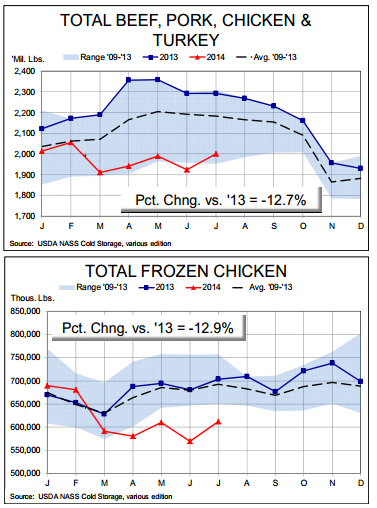



CME Report: US COOL Still Runs Afoul of WTO Rules
US - A number of news outlets reported over the weekend that the World Trade Organisation (WTO) has determined that USDA’s latest attempt to write rules for mandatory country of origin labelling still runs afoul of WTO rules, write Steve Meyer and Len Steiner.- Total meat and poultry stocks remain very tight. As can be seen at right, the total amount of beef, pork, chicken and turkey in freezers as of the end of July was — as it has been for now five months — near its lowest level of the past five years. The 31 July inventory of 1.9995 billion pounds was 12.7 per cent lower than one year ago. With beef and pork production levels expected to be low relatively to historical levels and chicken output growing only modestly for the remainder of this year, we do not expect these numbers to grow versus history much the rest of this year.
- Chicken is a major contributor to these lower frozen protein supplies. There’s nothing new about that statement since this is the fourth straight report in which the inventory of frozen chicken has been at it's lowest level in the past six years. 31 July stocks were 12.9 per cent lower than last year. But this is not simply a matter of lower output in the face of high domestic prices. In fact, stocks of breast meat — though still low versus history— are up 6.2 per cent versus their level of 31 July, 2013. That frozen stock figure was the lowest of the last five years, though. The big declines this year are in leg quarters (down 42.2 million pounds or 26 per cent from last year), wings (down 32.2 million pounds or 34 per cent from July 2013) and Other chicken (down 23.8 million pounds or 9.7 per cent from one year ago). Stocks of wings and leg quarters were record high one year ago.
A number of news outlets reported over the weekend that the World Trade Organisation (WTO) has determined that USDA’s latest attempt to write rules for mandatory country of origin labelling still runs afoul of WTO rules.
Our sources confirm the finding which was circulated to the affected countries late last week and will be publicly released in September. This is the second time that the MCOOL scheme has been found in violation of WTO rules and suggests strongly what we and many others have believed ever since MCOOL was adopted as part of the 2002 Farm Bill: It may not be possible to satisfy both the MCOOL legislation and WTO rules.
This ruling will give Canada and Mexico leave to impose retaliatory tariffs. Both countries have put together lists of products on which those tariffs will be levied though we have only seen the list from Canada.
It covers a broad range of items including a number of non?agricultural goods. The goal of retaliation, of course, is to get the offending country to change its policies so the tariffs will be aimed at other industries that have historically had strong lobbies or presences in the states or congressional districts of key members of Congress.
If one is going to apply a lever, one should apply it wisely, you know. Beef and pork are on Canada’s list and will most certainly be on Mexico’s. Mexico was the largest single destination for US pork products in 2013, ranking second for both muscle cuts (to Japan) and pork variety meats (to China/Hong Kong).
Canada was our fourth largest pork muscle cut market in 2013. On the beef side, Canada was our second largest muscle cut market in 2013 while Mexico ranked third for muscle cut exports and second (to Egypt) for variety meat tonnage but number one for variety meat value.
Mexico is far and away our largest broiler export customer, accounting for nearly 20 per cent of 2013 broiler exports. Tariffs will not stop exports to these countries but they will no doubt slow them and any reduction for markets as large as these two will have negative price impacts,especially if pork and broiler production increase at the same time.







